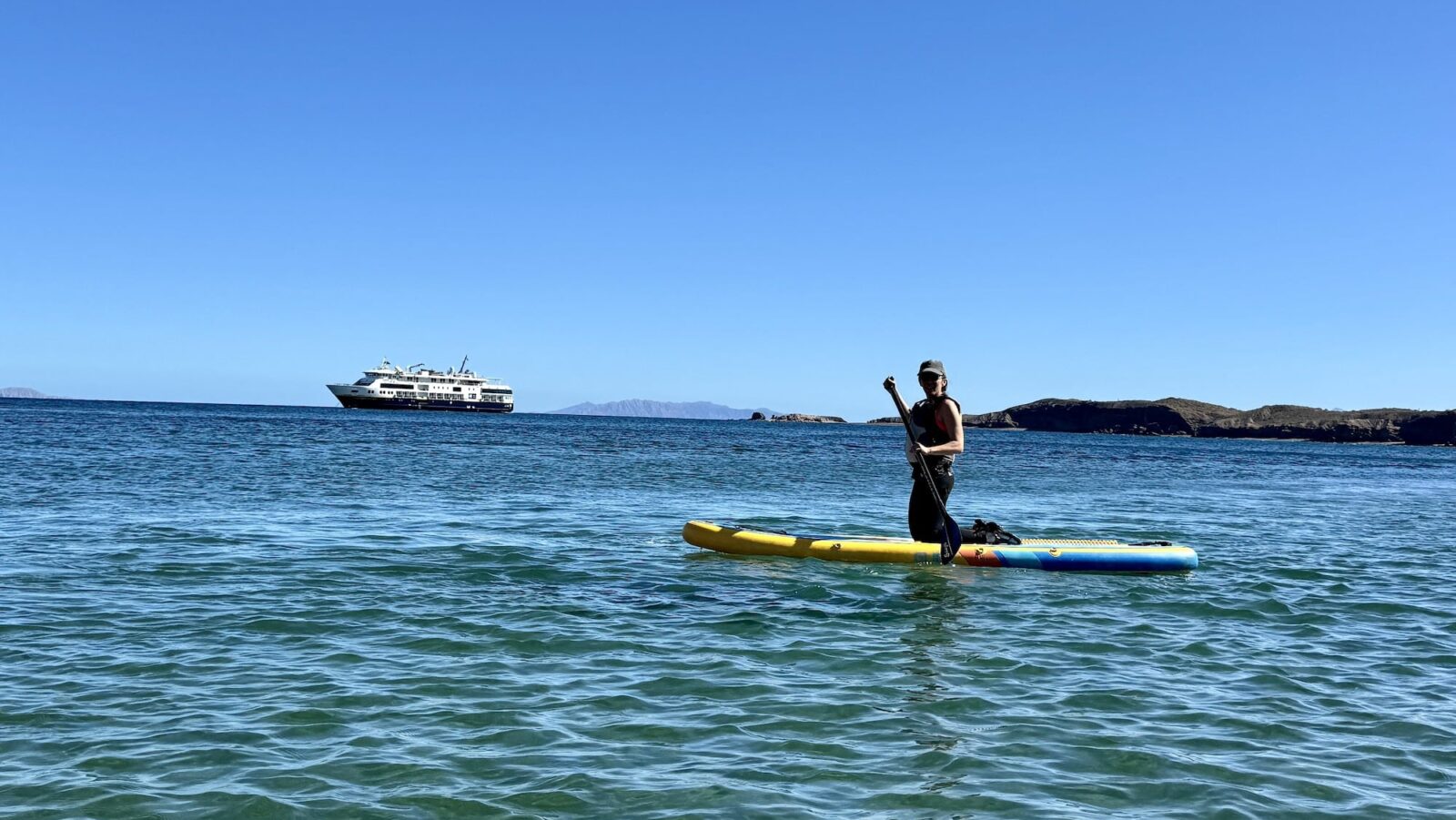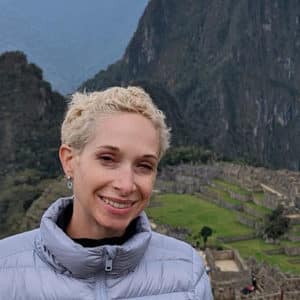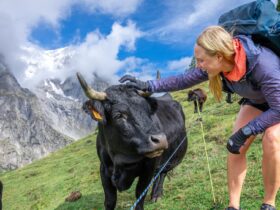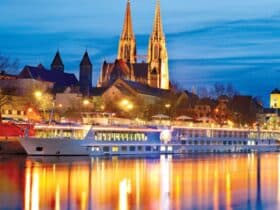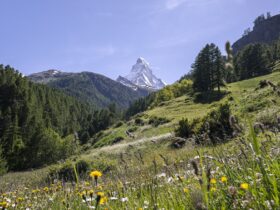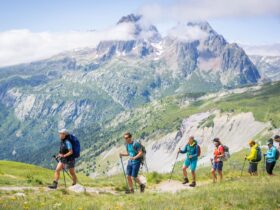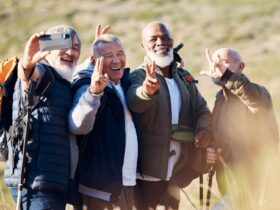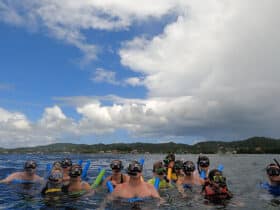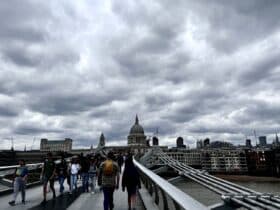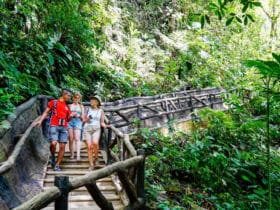It’s a funny thing to know ahead of time that a trip will be a life-changing experience. But one look at the Lindblad Expeditions itinerary Baja California: Among the Great Whales made it clear this was one of those rare times. But as I packed for my trip, I wondered if I had built it up too much in my mind, and that the actual experience might not be able to meet these high expectations.
I needn’t have worried. This excellent expedition cruise helped me reconnect with awe, nature, and gave me space to push my personal boundaries in a safe manner. The ship, the National Geographic Venture, was comfortable, well-appointed, and quickly came to feel like home (always a nice trait on a cruise of more than a few days).
DEEP DIVE: What to know about Lindblad before you book
The primary focus of this seasonal sailing is on whales—it takes place during the time gray and humpback whales are in Baja birthing and nursing their young before taking them north along their migratory route. But whales are just a small part of the incredible spectrum of wildlife you’re likely to see on this tour.
On my early February sailing, in addition to humpback and gray whales, we also saw sea lions, sea turtles, so many fish, dozens of dolphins, and enough birdlife that the birders onboard were nearly always aflutter. There’s also a lot to learn about the Baja California Sur ecosystem.
The safety part felt well-tended, which gave me lots of room to push my personal boundaries. I snorkeled above a swirling school of thousands of shining fish, swam with adolescent sea lions, paddle boarded in uninhabited bays, and (with some help from motion sickness meds), bounced across the waves in a panga (a small local boat) to catch glimpses of gray whales spy hopping.
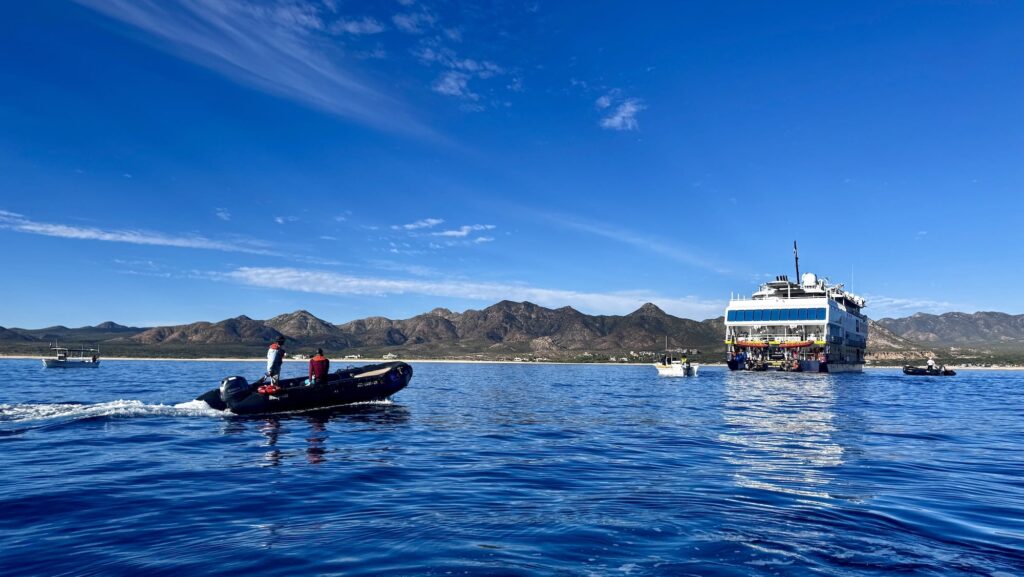
This cruise felt like a beacon for people who travel with care, curiosity, and a sense of environmental responsibility.
Things to Know About Baja California: Among the Great Whales
- The staff is large and impressive, and includes a mix of hospitality pros, scientists, and guides, all of whom are professional, personable, and seem to really like their jobs.
- The photos of the National Geographic Venture on the Lindblad site aren’t bad, but they don’t do it justice. Rooms on the ship are comfortable, feel upscale, and are tended to daily by hospitality staff that keeps everything in tip-top shape. I was way more impressed in person than I thought I would be based on the photos.
- There’s snorkeling and whale watching, but there’s no snorkeling with whales. Whale watching happens from both the ship’s deck and from small local boats called pangas.
- The onboard food is great. More on that below, but I was uniformly delighted by the meals.
- I mentioned it above, but Lindblad’s culture of safety is next level. Whether it was going from the ship to a zodiac, stepping into the water during a beach landing, or snorkeling with sea lions, I always saw and felt the ways in which staff were actively keeping guests safe.
- Short-sleeve wetsuits, fins, and snorkel sets are provided to each guest along with life jackets.
Tour Highlights
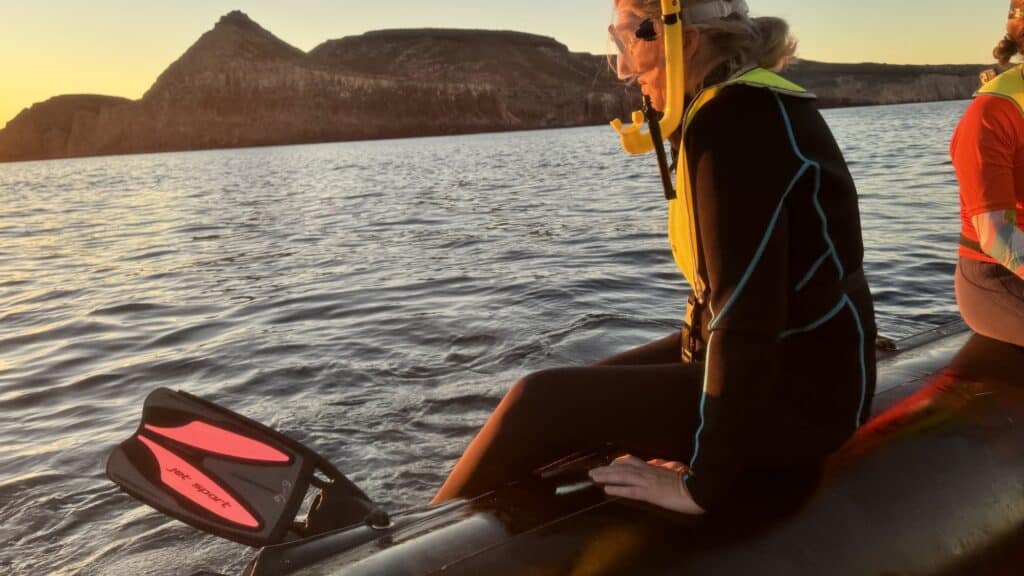
- Snorkeling in Cabo Pulmo National Park
- Sunrise snorkeling with sea lions at Los Islotes
- All the whale watching
- Photography and naturalist walks on uninhabited islands
- Learning sessions onboard the ship
Important Details About Baja California: Among the Great Whales
Itinerary
This eight-day expedition cruise trades off going eastbound and westbound around the tip of Baja California Sur. It includes time in Magdalena Bay on the Pacific side of the peninsula (a good jumping-off point to see gray whale mother and baby pairs), and an extended period on the Sea of Cortez.
PICTURE PERFECT: Whale photography tips from a pro
Every day, there’s at least one—and often two—big activities. Snorkeling, whale and wildlife watching trips aboard smaller boats (pangas and zodiacs), a city day in La Paz, and excursions to uninhabited islands and beaches are all on the itinerary. Note that the itinerary can shift depending on weather conditions (on my sailing, high winds meant some of our activities changed on the final day).
Each day felt interesting and varied, and naturalist talks and walks offered chances to learn a ton along the way.
Route Notes
On eastbound sailings, you fly into Loreto (on the Sea of Cortez side of the peninsula) and then take the two-and-a-half hour bus ride to San Carlos the Pacific side. On westbound sailings, you fly into Loreto and take a quick shuttle ride to the port to board the boat.
Activities
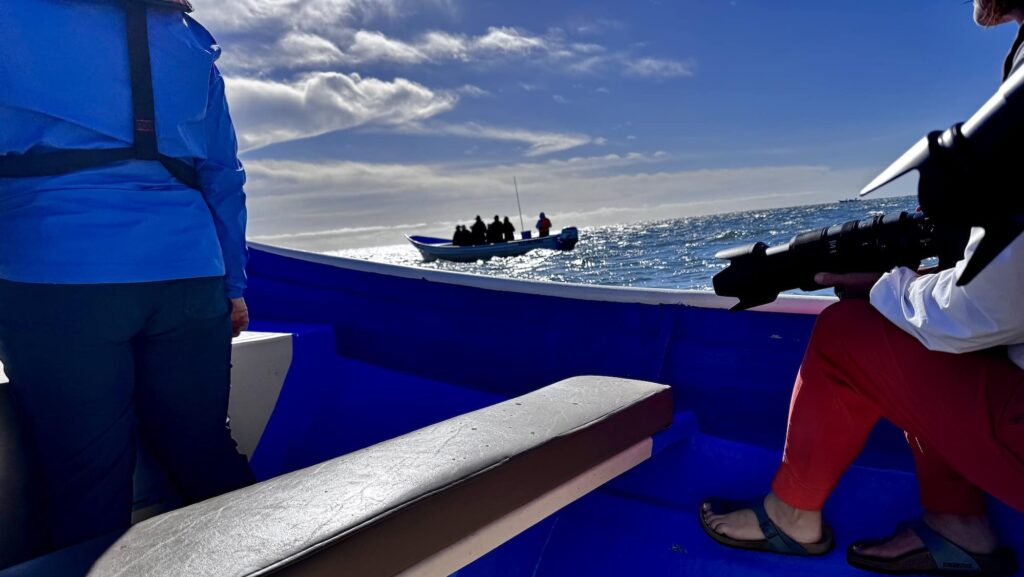
This is a pretty active cruise (though there’s always the option to hang out back at the ship). Activities include snorkeling, and on some of the snorkeling excursions, guests need to be able to use a small ladder to get in and out of the zodiac or panga (a small local boat style). There’s paddle boarding and kayaking, hiking and walking, and a city day in La Paz that includes a cultural performance and dinner. There’s also a lot of whale watching, both from the ship and aboard pangas.
Onboard, there are daily naturalist, photographer, and scientist talks, as well as a nightly meeting where guests and staff gather to recap the day and look ahead to the next day’s activities.
Accessibility
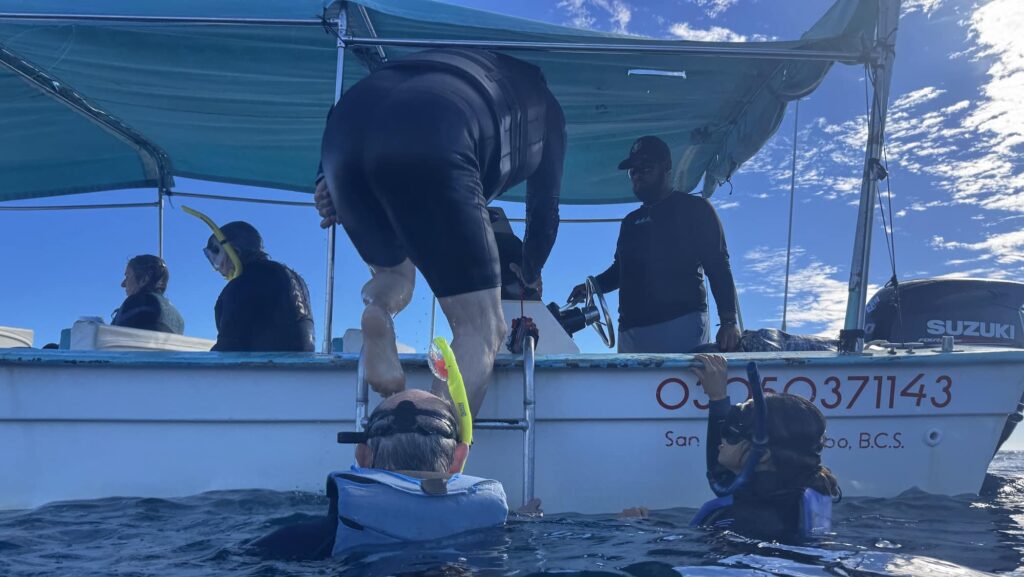
On my sailing, there were guests across the mobility spectrum. A number of the activities required getting into and out of zodiacs, doing water landings at beaches, transferring between boats (from a zodiac to a panga and back again), and some snorkeling excursions used ladders to get back up into small boats. But since it’s a cruise, guests could easily opt to stay on the ship, where there were lovely views, good food, an onboard library, and sun decks. The ship has an elevator, and when it was out of service, crew helped passengers with mobility issues move between the decks.
Families
In my opinion, this sailing is a good fit for families with kids who are relatively responsible and good swimmers. On sailings during school vacations and on those where there’s enough families onboard, Lindblad has a certified field educator onboard who leads kid activities throughout the trip as part of the company’s National Geographic Global Explorers program. The ship has rooms that comfortably fit three, and also has a few adjoining rooms for two that can be configured as a suite for a family of four.
FAMILY ADVENTURES: Our top picks for family-friendly tour companies
Dining
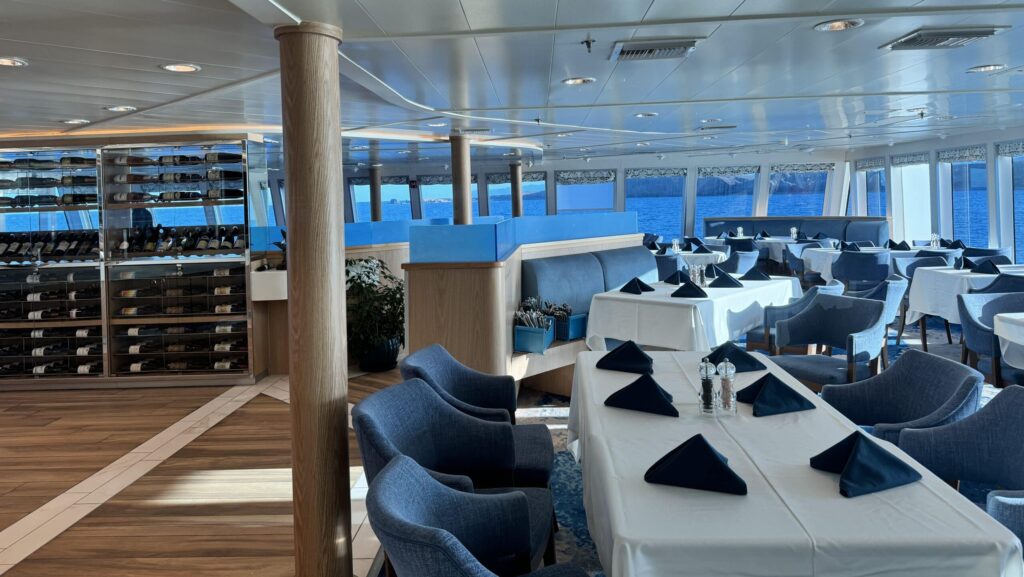
The onboard food is great. Breakfast is served as a buffet and lunch and dinner are both a la carte multi-course meals. The vibe in the dining room is casual (no one dresses up) and friendly, and you can sit wherever you like.
Big windows offer great views of the scenery, and the dining room staff are all kind and friendly. Freshly baked bread is served with each meal, and there’s a nice variety of appetizers and main courses daily. The serving sizes are modest in an attempt to reduce food waste, but it’s always ok to ask for another portion or another item.
There’s also a staffed bar in the lounge for drinks (included in the price of the cruise), plus a snacks, coffee, tea, and water area that’s refreshed regularly (and is the place to find the delicious little bags of freshly baked cookies the kitchen puts out). The espresso machine is self-serve, and makes great drinks (including decaf versions of coffee drinks). On most evenings there’s also a cocktail hour with signature drinks and appetizers in the lounge.
Amenities
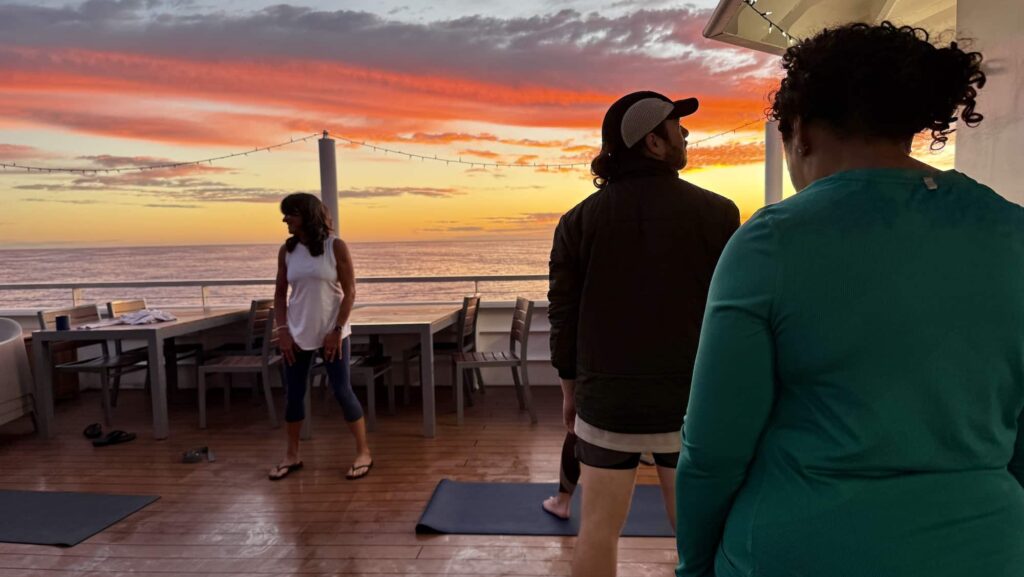
The National Geographic Venture has a fitness room, and the wellness coordinator offers daily early morning stretch classes on one of the decks. There are also spa services available for a fee. One of the coolest things offered onboard is the Gear Locker, a treasure trove of cameras, lenses, and other photography equipment available for guests to borrow.
Also available in the lounge: binoculars, sea sickness medication, and ginger candies. The ship is also staffed with a doctor (on my sailing, the doc helped me one night when the waves got bigger and seasickness kicked in). And daily, there’s a paper digest version available of the New York Times (it’s in a cubby near the gift shop).
In each stateroom, bathrooms come equipped with shampoo, conditioner, and body soap; plus a little baggie with SPF lip balm, a bar of exfoliating body soap, a great little loofah thing, and some foot cream.
Best for/Worst for
This tour is absolutely magical for relatively active people who love seeing wildlife and have an interest in conservation. I wouldn’t say you need a high level of fitness, but being able to get on and off a small boat (with help from the very safety conscious crew) is a regular occurrence, and so you’d want to be fairly confident with your ability to do that.
This tour would be tricky for people with significant mobility issues as well as for families with very young children.
A note about seasickness: I am prone to seasickness, but used the scopolamine patch on my sailing and had good results (my only issues came when the patch came off in the shower without me noticing it and after I removed the final patch and had some rebound nausea for about 36 hours). Most people on my sailing didn’t seem particularly effected by the rocking, especially on the more sheltered Sea of Cortez side. Sailing up the Pacific side of Baja California Sur was a bit rough, but once we moved into the protected bays where we spent the rest of the trip, it was fine again.



